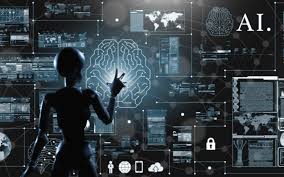Exploring Artificial Intelligence: Impact on Industries and Society
Artificial Intelligence (AI) is no longer a futuristic concept — it is an integral part of modern society and is significantly transforming industries and daily life. From self-driving cars to personalized online recommendations, AI is shaping how we work, communicate, and live. This technology promises to revolutionize various sectors, streamline processes, and even solve complex global challenges. However, it also presents new challenges, ethical considerations, and risks that society must navigate carefully.
In this article, we will explore how AI is impacting different industries, the benefits and challenges it brings, and its broader implications for society. We will examine its transformative effects in business, healthcare, education, transportation, and more. Additionally, we will reflect on how AI’s rapid development requires careful consideration of ethical issues and societal impacts to ensure a positive future.
1. Understanding Artificial Intelligence
AI refers to the development of computer systems that can perform tasks that traditionally require human intelligence, such as visual perception, speech recognition, decision-making, and language translation. At its core, AI relies on algorithms, machine learning, and deep learning to analyze vast amounts of data, identify patterns, and make predictions or decisions based on that data.
Key components of AI include:
- Machine Learning (ML): A subset of AI where machines learn from data, improving their performance without explicit programming.
- Deep Learning (DL): A type of ML inspired by the neural networks in the human brain, used for more complex tasks like image and speech recognition.
- Natural Language Processing (NLP): AI’s ability to understand and generate human language, used in chatbots, language translation, and voice assistants.
- Computer Vision: The ability of AI systems to interpret and make decisions based on visual inputs, such as in facial recognition and autonomous vehicles.
2. Impact on Industries
A. Healthcare: Revolutionizing Diagnosis and Treatment
AI is having a profound impact on healthcare, improving patient outcomes, reducing costs, and making healthcare more accessible. By analyzing large datasets from medical records, imaging, and clinical trials, AI is enhancing diagnostic accuracy, treatment planning, and patient care.
Key applications in healthcare:
- Medical Imaging: AI-powered systems can analyze medical images (X-rays, MRIs, CT scans) faster and more accurately than humans, detecting conditions like cancer, heart disease, and neurological disorders at earlier stages.
- Personalized Medicine: AI enables the customization of treatment plans based on a patient’s unique genetic makeup, lifestyle, and health data, improving effectiveness.
- Virtual Health Assistants: Chatbots and AI-driven platforms provide patients with personalized advice, reminders, and mental health support.
- Drug Discovery: AI speeds up the process of identifying new drugs by predicting molecular behavior, reducing the time and costs associated with research and development.
AI’s role in healthcare has the potential to drastically improve patient care, especially in areas with limited access to medical professionals. However, it also raises concerns about data privacy, security, and the potential for over-reliance on technology for critical medical decisions.
B. Finance: Transforming the Financial Sector
The financial industry is leveraging AI to streamline operations, enhance security, and create personalized financial experiences for customers. Banks and financial institutions use AI for tasks ranging from fraud detection to customer service.
Key applications in finance:
- Fraud Detection: AI systems can analyze transaction patterns and identify anomalies that may indicate fraudulent activity, reducing financial losses.
- Algorithmic Trading: AI-driven trading algorithms can process vast amounts of market data to make split-second decisions, offering higher efficiency and potentially greater returns.
- Personalized Banking: AI is used to recommend personalized financial products, monitor spending habits, and offer tailored investment strategies.
- Customer Service: AI chatbots and virtual assistants are available 24/7 to assist customers with inquiries, account management, and financial advice.
While AI has enhanced efficiency and security in finance, concerns around algorithmic biases, financial stability, and potential job displacement due to automation remain significant challenges.
C. Retail: Enhancing Customer Experience and Efficiency
AI is transforming the retail industry by personalizing the shopping experience, optimizing supply chains, and improving inventory management. Retailers use AI to understand consumer preferences, predict trends, and deliver more targeted marketing.
Key applications in retail:
- Personalized Recommendations: AI analyzes customer data to suggest products based on previous purchases, preferences, and browsing behavior, improving customer satisfaction and sales.
- Smart Inventory Management: AI helps retailers manage inventory more efficiently by predicting demand and automatically adjusting stock levels, reducing waste and out-of-stock situations.
- Customer Service: AI-powered chatbots assist customers with their inquiries and purchase decisions, providing real-time support and freeing up human resources.
- Automated Checkouts: Some retailers use AI to create cashier-less stores, where customers can pick up items and automatically pay through sensors and cameras.
While AI enhances the retail experience, it raises ethical issues related to data privacy, surveillance, and the potential for monopolies among large retailers who dominate AI technology.
D. Transportation: Changing the Future of Mobility
The transportation industry is being revolutionized by AI, particularly in areas like autonomous vehicles, traffic management, and logistics optimization. AI is poised to reshape the way people and goods move around the world, making transportation safer and more efficient.
Key applications in transportation:
- Autonomous Vehicles: Self-driving cars and trucks powered by AI are expected to reduce accidents caused by human error, decrease traffic congestion, and optimize fuel efficiency.
- Traffic Management: AI-powered systems are being used to optimize traffic flow in urban areas by analyzing real-time traffic data and adjusting traffic signals accordingly.
- Logistics and Delivery: AI is helping to optimize supply chains, track shipments, and predict the best delivery routes, reducing costs and improving efficiency for businesses and consumers.
While AI-powered transportation systems offer significant benefits, they also pose challenges in terms of safety, cybersecurity, regulatory compliance, and the potential displacement of jobs, particularly in the transportation sector.
3. Impact on Society
A. Workforce Transformation: Job Displacement and Creation
AI’s rise is leading to significant changes in the workforce. While AI can automate routine tasks and improve efficiency, it may also lead to job displacement in industries such as manufacturing, retail, and customer service. The adoption of AI requires new skills, and workers must adapt to the evolving demands of the job market.
Challenges:
- Job Displacement: Many low-skill and repetitive jobs are at risk of being replaced by AI-driven automation, which may result in unemployment or underemployment in certain sectors.
- Skills Gap: There is an increasing need for workers to acquire new skills in areas like AI, machine learning, data science, and software engineering to remain competitive in the job market.
- Economic Inequality: The benefits of AI may be concentrated in certain sectors or among individuals with the right skills, leading to increased economic disparity.
Opportunities:
- Job Creation: AI also creates new jobs in tech development, data science, AI ethics, and other emerging fields. Additionally, AI can enhance human workers’ capabilities, leading to higher productivity and new opportunities for career advancement.
- Upskilling and Reskilling: Governments, businesses, and educational institutions are focusing on upskilling and reskilling programs to help workers transition to AI-driven roles.
B. Ethical Considerations: Privacy, Bias, and Accountability
AI raises numerous ethical concerns that society must address to ensure that its benefits are realized in a fair and responsible manner.
Key ethical concerns:
- Privacy: AI systems, especially those that rely on big data, often raise concerns about the collection and use of personal information. Protecting user privacy and ensuring data security is critical to preventing misuse.
- Bias and Discrimination: AI algorithms are trained on data, and if that data reflects human biases, the AI system can perpetuate and even amplify those biases. This can lead to discrimination in areas like hiring, lending, and law enforcement.
- Accountability: As AI takes on more decision-making roles, questions about accountability and responsibility arise. Who is responsible when an AI system makes a mistake or causes harm — the developer, the company, or the machine itself?
Ethical frameworks and regulatory oversight will be essential to address these concerns and ensure that AI is developed and deployed in a manner that is fair, transparent, and beneficial to all.
4. The Future of AI: Challenges and Opportunities
AI’s potential is vast, and as technology continues to evolve, its impact on industries and society will grow exponentially. However, it’s crucial that stakeholders — from governments and businesses to researchers and consumers — collaborate to ensure that AI is developed responsibly.
Future opportunities:
- Solving Global Challenges: AI can help address critical global issues, such as climate change, disease prevention, and poverty, by analyzing complex data and providing solutions that humans alone cannot.
- Human-AI Collaboration: Rather than replacing humans, AI can enhance human capabilities. Collaboration between AI systems and workers in fields like healthcare, education, and research can lead to innovative breakthroughs and greater efficiency.
- AI for Social Good: AI can be used for positive social impact, such as providing accessibility tools for individuals with disabilities, improving disaster response, and aiding in humanitarian efforts.
Future challenges:
- Regulation and Oversight: Governments will need to develop effective regulations to manage AI’s growth while balancing innovation with accountability and fairness.
- Public Trust: Building public trust in AI technologies is essential to ensuring widespread adoption and mitigating fears about job loss and ethical concerns.
5. Conclusion
Artificial Intelligence is reshaping industries, enhancing productivity, and solving complex problems. It offers significant potential to improve human life and drive innovation. However, it also brings challenges, including concerns about job displacement, ethical implications, and the risk of exacerbating inequalities. The responsible development, deployment, and governance of AI will determine its ultimate impact on society.
By addressing these challenges head-on and fostering collaboration between businesses, governments, and consumers, AI can be harnessed for the greater good. Embracing AI’s capabilities while safeguarding ethics and human values will ensure a future where this transformative technology benefits everyone.
Key Takeaways:
- AI is revolutionizing industries, particularly healthcare, finance, retail, and transportation, by increasing efficiency, enhancing customer experiences, and solving complex problems.
- Ethical challenges such as data privacy, bias, and accountability must be addressed to ensure AI is developed responsibly.
- AI transforms the workforce, creating both opportunities and challenges related to job displacement, skill gaps, and economic inequality.
- Collaboration and regulation are key to harnessing AI’s benefits while mitigating risks and ensuring fair, responsible use.
- AI holds immense potential to solve global challenges and improve quality of life, but must be carefully managed to avoid negative societal impacts.

